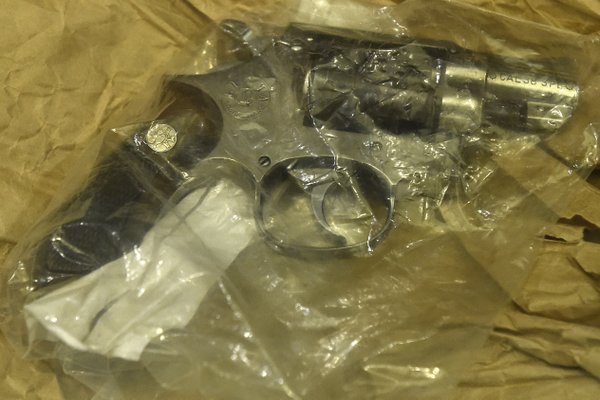
Evidence is presented at the trial of Mehdi Nemmouche at the Justice Palace in Brussels, Tuesday, Jan. 29, 2019. (Photo: AP)
The young daughters of an Israeli couple gunned down at a Jewish museum in Belgium came face to face on Thursday with the man accused of killing their parents.
Speaking Hebrew quietly through an interpreter at the Brussels criminal court, Shira and Ayalet Riva — who were aged 17 and 15 when Emanuel and Miriam Riva were shot at point blank range on May 24, 2014 — spoke of two devoted parents who were in the Belgian capital on vacation to mark their wedding anniversary.
The shooting, blamed on a suspected French jihadi who spent time in Syria and which crystalized fears that European extremists would use their experience in places like Syria or Iraq to sow terror back home, turned the young women’s lives upside down.
“Our lives have completely changed. Parties, birthdays, everything is different. Nothing is like it was,” said Ayalet, seated at a desk a few meters from the revolver used to shoot her parents in the back of the head at the entrance to the Jewish Museum in Brussels.
“We live alone. We have to take care ourselves alone. Even if we get help from the family, we still take care of ourselves alone,” she said.
To her right, defendant Mehdi Nemmouche, flanked by police officers wearing ski masks, sat impassively and barely looked at the women as they testified.
Nemmouche, 33, is charged with “terrorist murder” over the killing of the Israeli couple and two people working at the museum. Nacer Bendrer, 30, is also in court, accused of supplying the weapons used in the killing.
Nemmouche’s lawyers have said he was a patsy coerced into transporting the weapons used in the attack by the real killers, agents from the Israeli intelligence agency Mossad.
At first too upset to answer the presiding judge’s questions about how they learned of their parents’ deaths and of their lives since, Shira eventually said that “day to day, things are very difficult.”
“We try to support each other as much as we can,” she told the court. “Our lives will go on, but this tragedy will always be with us.”
Before they entered the court, family photos of the girls with their parents on various vacations and in their home were projected on a screen for the jury.
Nemmouche glanced at some, but mostly looked elsewhere. He is unlikely to have lived such moments. His lawyers have said he was abandoned as a toddler, raised at first in a Christian family, then went to live with his grandfather for a while. Defiantly independent, he has routinely slept in sheds and garages over the years, as well as prison cells.
“I am not the museum killer,” Nemmouche reaffirmed as Thursday’s session began, in rare remarks to the court.
Emanuel Riva’s twin brother, Arieh, also testified.
“I have never known life without him. We were born together. He was the eldest, born 5 minutes before me,” Arieh said of his sibling. “We were always in touch. We spoke at least once a week. We knew everything about each other.”
Arieh, an accountant like his brother, said that coming to Brussels to testify “upsets us, brings back bad memories.”
Earlier Thursday, Nemmouche told the court that he had nothing to do with an apparent attempt to intimidate a lawyer involved in the trial, and appealed for all court officials be left alone.
Investigators are probing the theft Tuesday of a laptop computer containing Nemmouche’s case file from lawyer Vincent Lurquin, who is representing a woman who was visiting the museum when the attack happened. A baseball bat and a fake assault rifle were left on the lawyer’s desk.
“I have absolutely nothing to do with this theft, which I strongly condemn,” said Nemmouche, who has mostly exercised his right to silence in the three weeks the trial has run. “I ask that that all the magistrates and all the jurors be left alone,” he said, reading a statement to the court.
The trial is scheduled to run until March 1.


